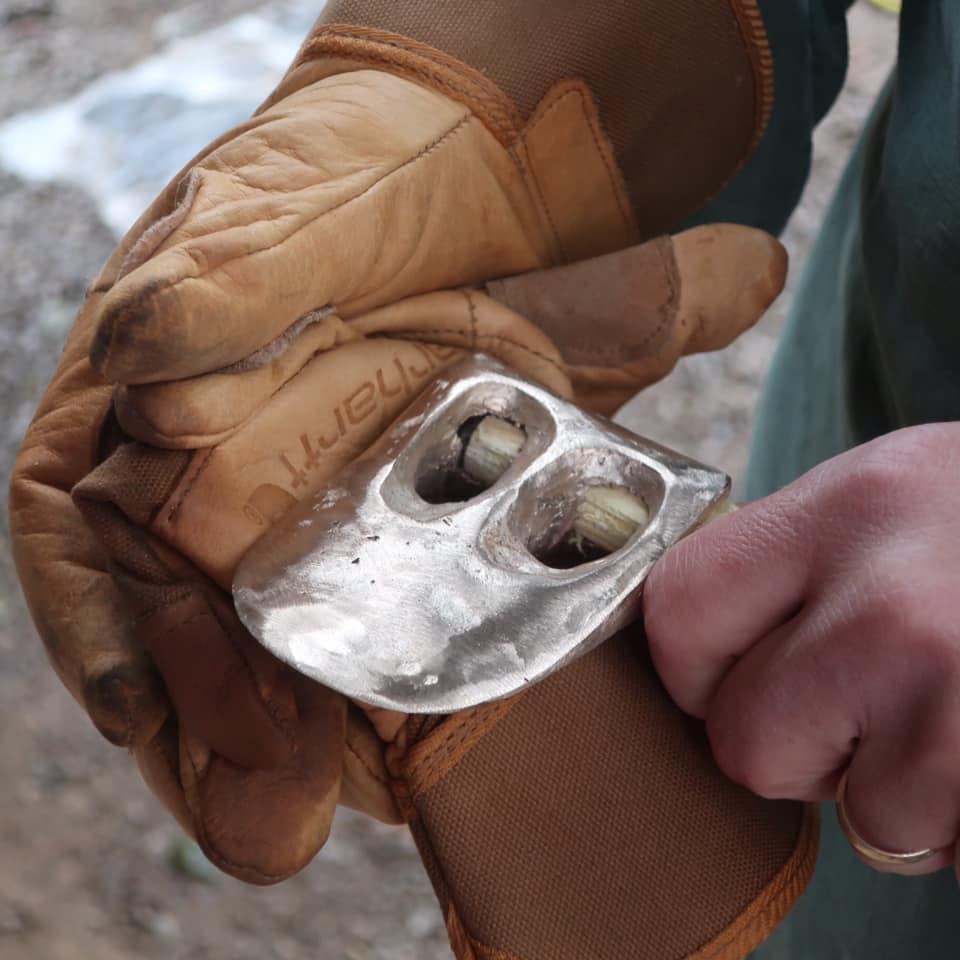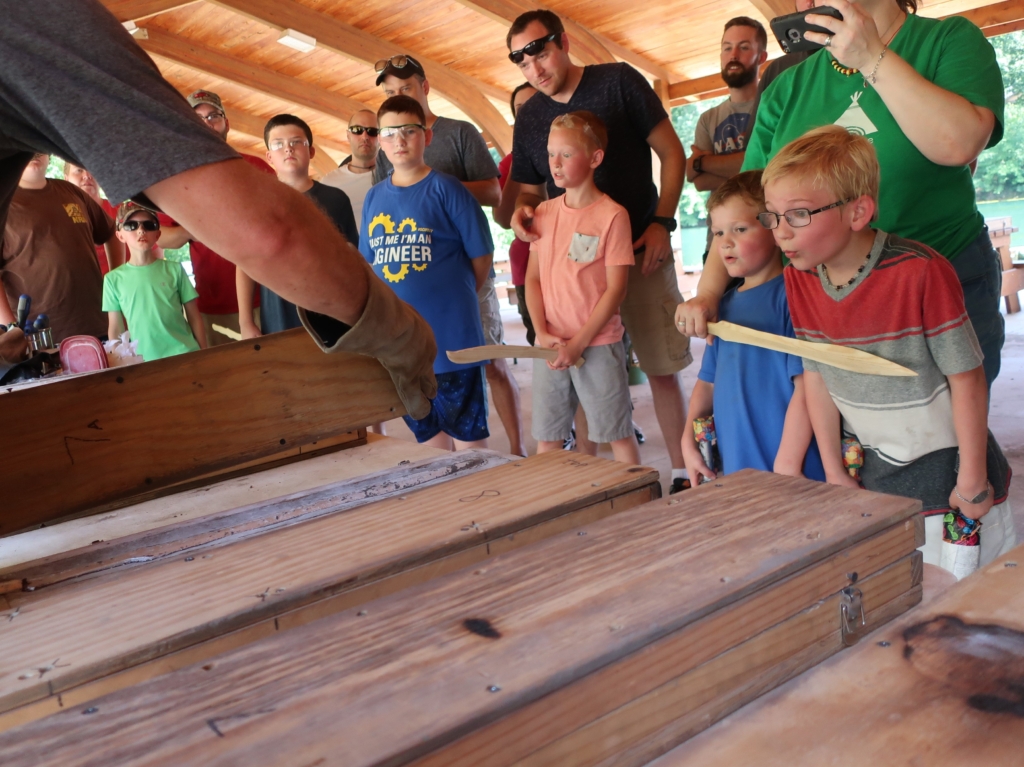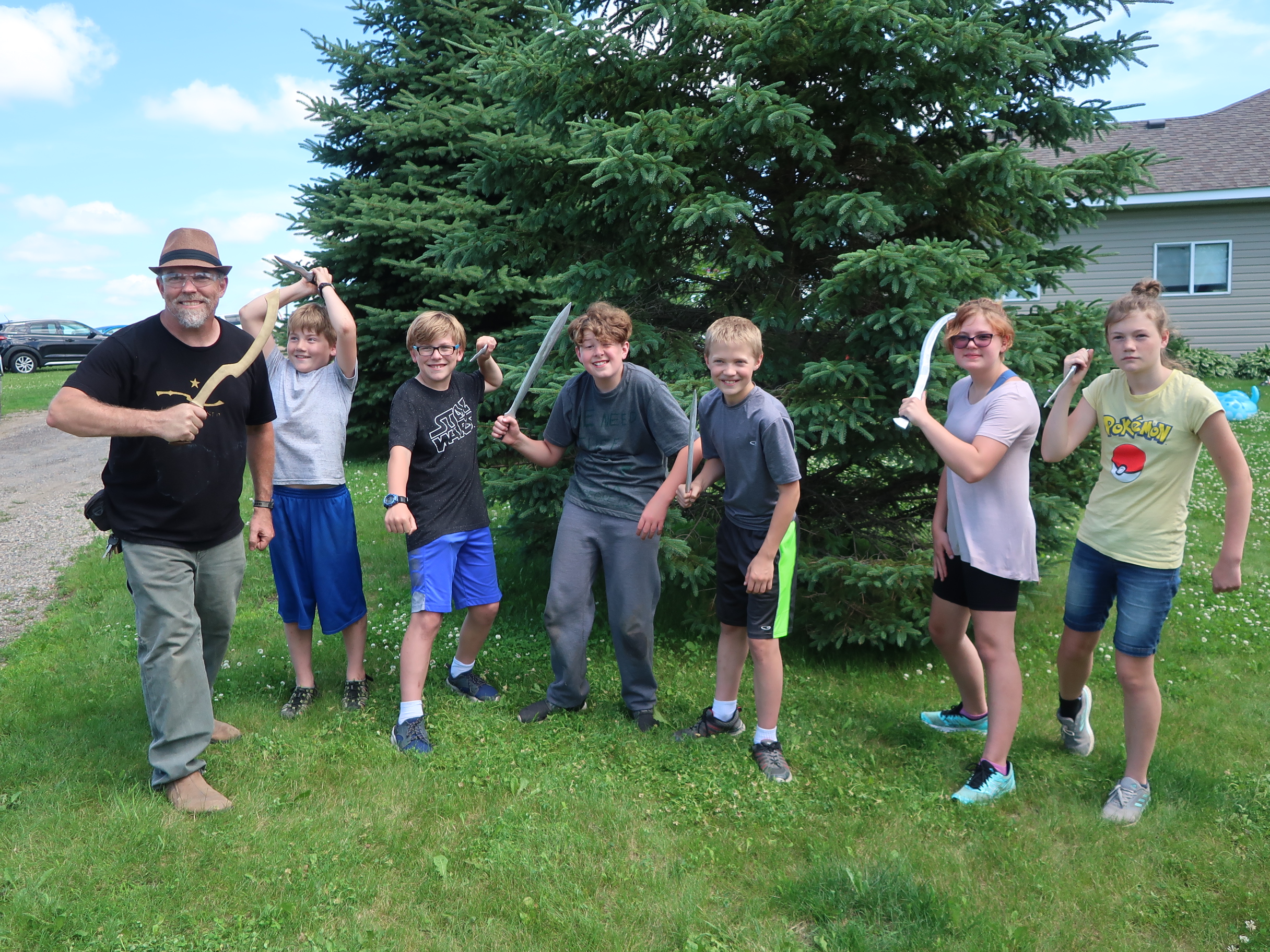So you’re interested in a sword (or axe) casting class. What exactly does it look like?
The class begins with my talking about the history of metallurgy and passing around several artifacts and sword models from the Bronze Age. After learning the histories of several swords, everyone chooses a wood master sword to cast. Next, they get a casting box and get a lesson in making a careful sand cast. After everyone is finished packing their mold, they learn more about metallurgy and chemistry while I heat up the aluminum in the foundry. Next, the molten aluminum is poured into the molds while everyone watches from a few feet away. After cooling for a few minutes, the swords are unboxed. Next, the kids have a 1 hour break while several adults and I polish the swords with angle grinders. Note: for safety, swords are not sharpened to a cutting edge in class. The last step is to wrap handles in leather.
Two types of sword classes–and, BRAND NEW, an axe class!
There are two different types of sword classes, and the hosting requirements of each are slightly different. I’ll describe the requirements of the aluminum class first, as it is my most popular, and point out the differences in the bronze class later. To host the 6 hour aluminum class, I need a shaded work area (10′ x 30′ or so), electricity, and bathroom access for participants. I’ve held classes in shady driveways, park pavilions, workshops, 2 car garages, community centers, schools, auto body shops, churches, and even at a dinosaur park. Most classes take place outside, but the location should also include a rain or cold weather plan. Because damp sand is used in the sand casting process, that portion of class must take place in shade and in temperatures over 40 degrees.
The aluminum class has a 15 person minimum & 30 person maximum. A good first step to hosting a class is conducting a straw poll of your friends by email and on social media to see if you know enough interested people–usually this is no problem! And you don’t need to find everyone yourself–after a few days, I’ll post your class on my calendar where others looking for a class can find it. It is helpful to show friends the following video of what the class involves: https://youtu.be/vtPHmAC1r6I The cost is $120 per sword. Sometimes (frequently!) more than one family member helps to work on one sword. Adults are welcome to cast their own swords or to come and help a child—I’m happy to say the class has lots of cross-generational appeal, and lots of adults cast their own swords. The suggested age range for this class is 5 & up, though exceptions can sometimes be made for younger siblings. When I’m traveling, l’m open to teaching one or two classes per location, but will only open up a 2nd class if the first one sells out. The host gets a free sword & tons of street cred for each class hosted.
Once someone decides to host, they provide me an address & I create an event online. Afterwards, families buy tickets directly from the link, so the host needn’t be involved with collecting money. To maintain privacy, I create the listing with nearby cross streets & only give the exact address to people who have purchased tickets.
Hosting a bronze sword class The bronze class is an advanced version of the aluminum class. It has a 10 person minimum (max 12), costs $300 per person, and takes 10 hours. This class starts with the same casting process as the aluminum class, but continues with several hours of fine finishing of the blade and finally attaching wood handle scales. This is typically an older teen or adult class, though I’ve had some younger teens take the class with a parent. Participants do all of the work themselves–several hours of using an angle grinder and later a palm sander– so it takes stamina and a sense of humor. A video showing the bronze class can be seen at https://youtu.be/PKsoch0DNfc In return for hosting a bronze class, the host gets a $100 discount on the price of their sword.

NEW–The duckbill axe class is the newest of my casting class offerings, and was originally developed in collaboration with a teaching farm near Austin. The owner was excited about metal casting, but didn’t feel that swords fit well with her curriculum. Axes, on the other hand, were crucial farm tools used all over the world and were an obvious fit.
And I had a really unique ax in mind: originally found around the ancient city of Ur in Mesopotamia, Canaanite duckbill axes go back 4,000 years and represent a big step forward in weapon (and tool) casting technology. As I researched this ancient axe and experimented with how to make it, there was a lot of trial and error; unlike a sword, this complex design cannot be made with a simple two part mold. Therefore, this class is taught as a design challenge, taking time to brainstorm and wrestle with the problem of how people thousands of years ago could have cast this complex tool. In a 6 hour class, you’ll learn the history of this intriguing weapon, then get your hands dirty learning to make a sand cast using a historically accurate pattern. Next, watch from a few feet away as I pour 2,000 degree molten bronze into your mold. Afterwards, you’ll carve a handle for your axe from cedar wood much like they would have used in Mesopotamia. You’ll leave class with a much deeper understanding of ancient metallurgy & with an artifact that will be treasured for years to come. The cost is $150 per axe. This class has the same hosting requirements as the aluminum class and the host gets a free ax for hosting.

If you haven’t already, take a minute to go to my Sword Casting Guy FB page & read comments from past participants & hosts. I hope you’ll host a class and see what the excitement is all about!
FAQS
What if the class minimum (15) is not met?
If a class does not meet minimum enrollment, it will be canceled and tickets refunded one week before the scheduled class day. This is extremely rare, however—usually classes sell out quickly!
Is it safe?
I’m a veteran science teacher, so I have a keen eye for safety. Participants are never closer than 10 feet from molten metal and there has never been a single burn in my classes. Regardless of the weather, the foundry is always operated outside. Even though the foundry gets very hot inside, it poses no fire risk, as there are no sparks and no part that touches the ground is hot enough to start a fire.
Why host a class instead of waiting for someone else to host it?
If you host a class for me, you get a free sword, but you also get to decide when and where a class will happen. If you wait for others to host, you may find your closest class is 100 miles away or at an inconvenient time. Everyone who has hosted my class in the past has had a good experience and usually offers to host again if I’m back in the area.
To begin the process of hosting a class, please email me at swordcastingguy@gmail.com
I get lots of requests to host classes, so you’ll increase your chances of landing a class by doing your research ahead of time. Please include the following:
Name
Cell number (text)
How many interested people are there? If it is a class for kids, are there adults who can help? Describe your group.
When would you like to host your class? (If you are open to weekdays, your class will likely happen sooner–there are only so many weekends)
Where will you host a class? Please describe the space.



